Career Paths

Frequently Asked Questions
What are Career Clusters and Pathways?Career Clusters are broad occupational groupings based on a set of common knowledge and skills, while Career Pathways are a sub-grouping of occupations and career specialties. Similar to the way Career Clusters are organized, Career Pathways are also grouped based on their requirements for a set of common knowledge and skills for career success. Harper's Career Pathways serve as roadmaps for a list of occupations that visually chart the certificates, degrees and skills progression needed to get to entry-level positions and continuing on through career advancement opportunities. They also include occupation and wage information.
We all need good information to make good decisions. Exploring all of the options that interest you will help you on the path to learning more and earning more.
The Harper Career Paths are a tool to make the connection between school, learning, and your future in the workplace. The comprehensive list of certificates you can earn while working and subsequent certificates and degrees can help you get ready for the future you seek.
If you are a person who learns best by doing, then earning a certificate may allow you to enter your career field and begin applying your knowledge. You may continue at Harper to earn another certificate or perhaps an Associate Degree, all the time building on your knowledge and experience while working in your chosen field.
The ability for certificates to build or “stack” to an Associate Degree differs from industry to industry. Look for the word “Stackable” on the pathways to determine if certificates lead to an Associate Degree.
Use the abundant resources for college and training exploration in the Harper Career Development Services. Here you will find options to finance your future education, understand employment skills, and learn about high demand jobs in careers that interest you. Start by gaining an understanding of yourself, then explore your interests, and discover your talents.
Your counselor can help you create an Academic Career Plan designed just for you. You may speak with the Dean, or Professors in the department that interests you, and you can also speak with specialists in the Career Development Services.
The sooner you connect your learning to your career, the more likely you are to meet your education needs and career goals. Counselors and Career Specialists in the Career Development Services at Harper can discuss potential career paths, and potential majors with students, given their interests and courses they are taking or have taken, as early as the beginning of their first semester.
Tutorial
- What are Career Clusters?
- What are Career Paths?
- Why Career Paths?
- How to Use the Career Paths to View Areas of Study
- Learn more about Harper transfer agreements with 4-year colleges
- Labor Market and Wage Information
- Industry Certifications and Licensure
A Career Cluster is a grouping of occupations according to common knowledge and skills for the purpose of organizing educational programs and curricula. The framework of Career Clusters, Career Pathways, and Programs of Study organizes educational preparation and occupational choices into a unified concept. By combining rigorous academics with career and technical education, students have a clear path to their future.
As shown below, Illinois created a system of aligned, non-duplicative programs that support student transitions from one level to the next to answer the call from the federal government to further improve Career and Technical Education.
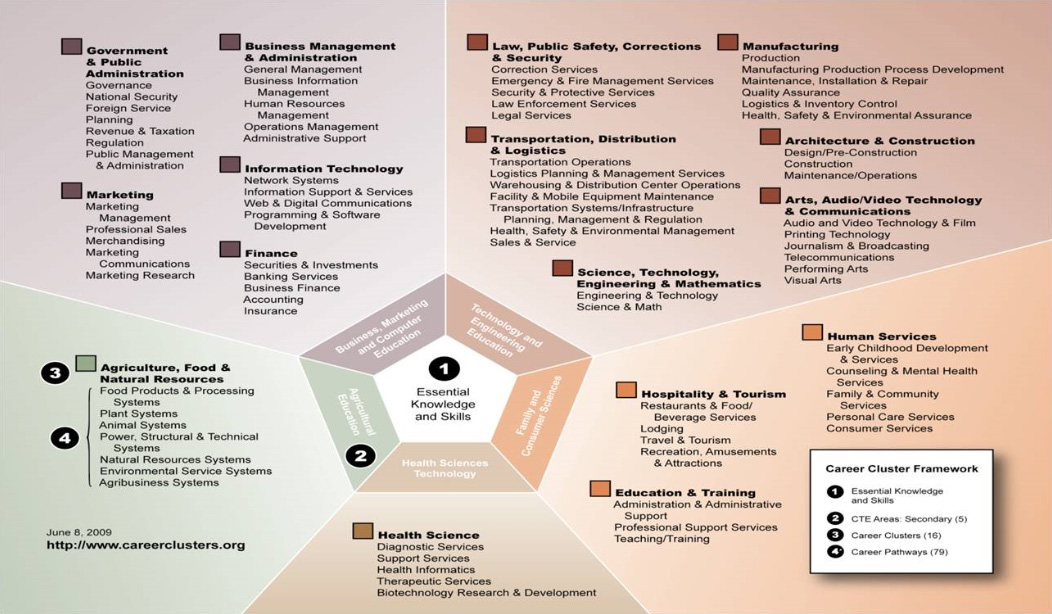
Illinois adopted the national Career Cluster framework. To learn more about the 16 Career Clusters and pathways associated within each cluster and access national and statewide cluster/pathway materials that have been developed go to, https://www.iccb.org/
What are Career Paths?Career Paths act as a personal GPS system for individuals to find their way to gainful employment and a successful career. A Career Path is a coherent, articulated sequence of rigorous academic and career courses, leading to an associate degree, baccalaureate degree and beyond, an industry-recognized certificate, and/or licensure.”
The Career Paths at Harper College help you easily explore various paths to help you complete a post-secondary credential. Harper College has developed a Career Path for each of its career programs.
Some of the Career Paths are a guide showing how to advance in a career by earning certificates that, when “stacked” together, lead to higher paying jobs. Learn More – Earn More. These show you how to pursue a career by advancing through short term certificates that have clear labor market value and then how to build on them to access more advanced jobs and higher wages.
These Career Paths are interactive and link you to valuable information. By selecting certificates and degrees, you can learn about the courses required to complete each credential. For specific Job Outlook and Wage Information select the link beneath a job title. When there are industry certifications or licensure, that information is also available through the Career Path.
Why Career Paths?Career Paths help students know how to navigate their career through certificates and credentials. The students go from fragmented course-taking to clear educational pathways. They offer students an accelerated entrance to the job market.
Learn more about Harper transfer agreements with 4-year collegesChoose "Learn more about Harper transfer agreements with 4-year colleges." This will take you to information about transfer agreements to 4-year Colleges or Universities. Learn how you can continue your education in this career field by securing a baccalaureate degree.
Labor Market and Wage Information-
At the bottom left you will see small colored boxes that correspond to the certificate boxes along the Career Path. Next to these small boxes are the job titles for the career path you are exploring. Select the link to learn details about the knowledge, skills, abilities, personality, and technology needed for the job. From here you can scroll down to learn about education required, and the job outlook, including state salaries and current job openings. Select a specific job title link to learn more; as shown below for Licensed Practical Nurse.
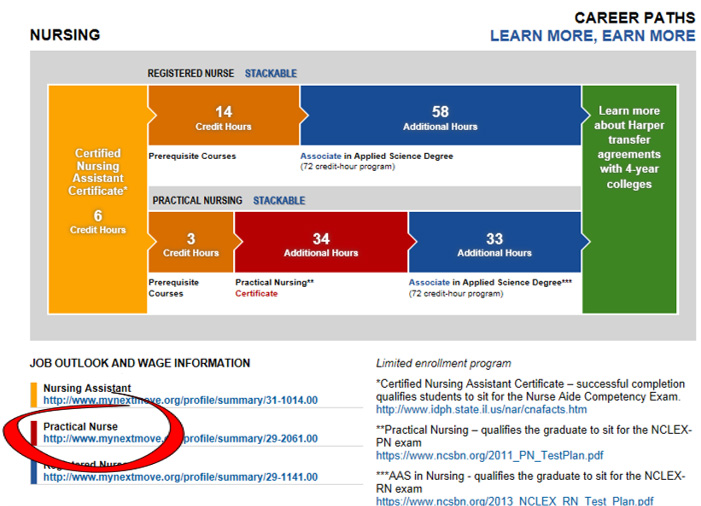
-
Explore the external job site. There are other careers to consider at the lower right and wage information. Sometimes there are helpful videos about the career as you explore the links on the site.
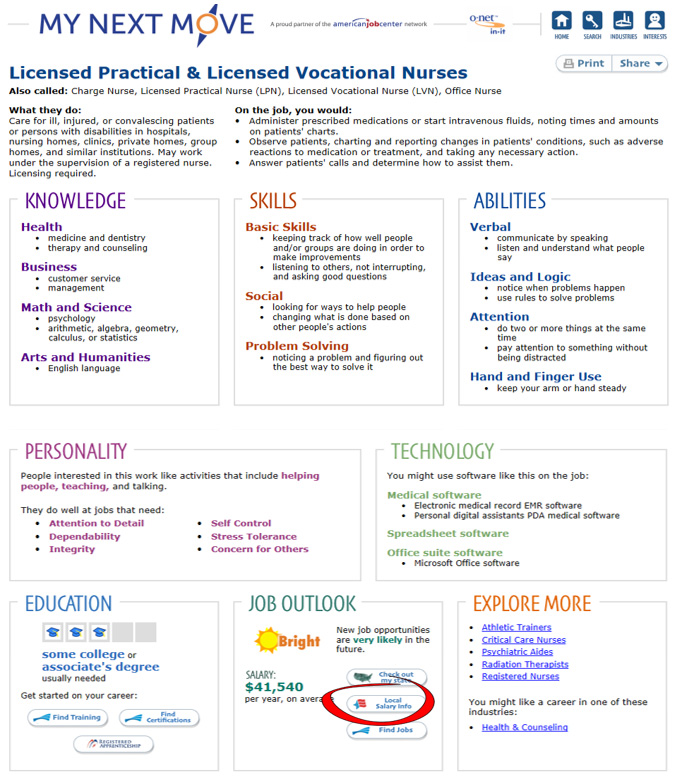
-
Select Local Salary Info to view wage information for your state or zip code.

-
Select, “Learn more about this occupation” at the bottom left to view an Occupation Profile and sometimes a Career video.
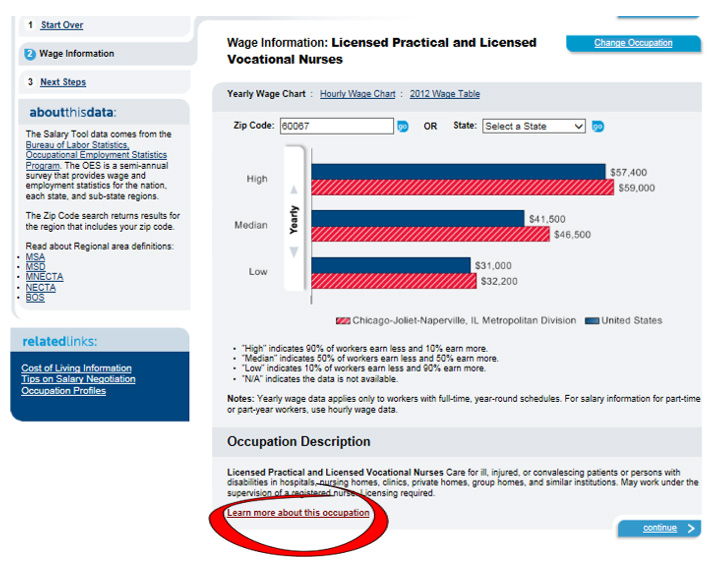
-
Select continue, select your state and select continue to view the Occupation Profile for a Licensed Practical Nurse including a career video at https://www.mynextmove.org/profile/ext/salary/29-2061.00?s=IL&g=Go
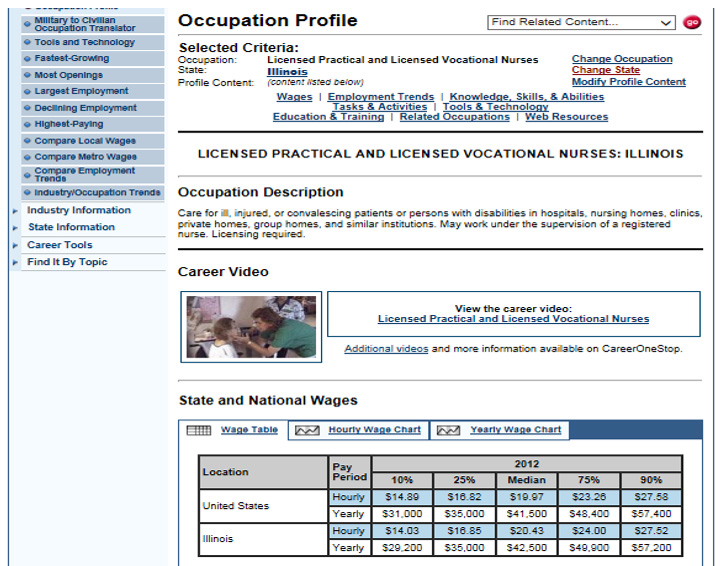
If the career field offers industry certifications and licensure, you can find information about them at the lower right of the Career Path. Choose the link to learn more; as shown below for Health Information Technology Certification Exams.
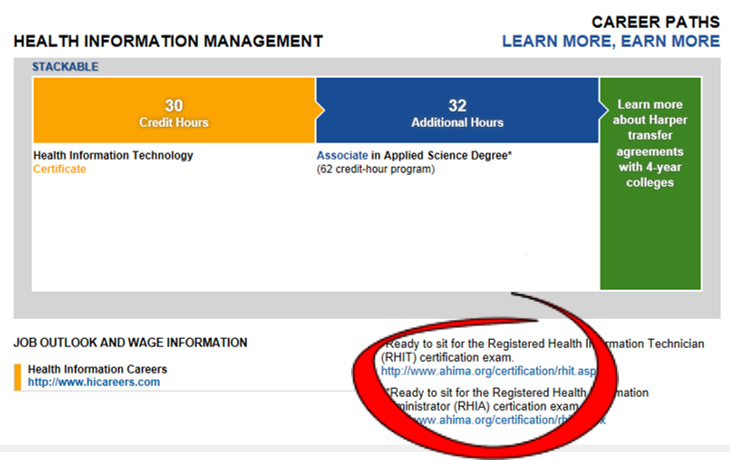
Glossary
- Articulation Agreement
- Associate of Applied Science Degree
- Associate of Arts and Associate of Science Degree
- Bachelor’s Degree
- Career Clusters
- Career Pathways
- Career Prep
- Career and Technical Programs (CTP)
- Credit for Prior Learning
- Knowledge and Skills
- Liberal Arts and Sciences
- Master’s Degree
- Occupations/Career Specialties
- Program of Study (Curriculum Framework)
An articulation agreement is a formal agreement between institutions that allows credit for a course or sequence of courses taken at one institution to be applied in specific programs at another institution. These agreements may be between a high school and a postsecondary institution, or among postsecondary institutions
Associate of Applied Science DegreeAn AAS degree helps individuals prepare for, or advance in, a particular occupation or field. Most AAS degrees require 60-70 credits and consist of technical studies, general studies and electives. Time to completion varies widely. Some or all credits may be applied toward a bachelor's degree program at a four-year college.
Associate of Arts and Associate of Science DegreeAn Associate of Arts & Science Degree is awarded to an individual for completion of a program that is intended for transfer to a four-year college or university. The degree requirements usually include courses in fine arts, humanities, mathematical and natural sciences, and social sciences.
Bachelor’s DegreeA bachelor’s degree is an academic degree that is awarded to individuals for completion of an undergraduate course or major that generally lasts for four years.
Career ClustersIn their simplest form, Career Clusters are groupings of occupations/career specialties used as an organizing tool for curriculum design and instruction. Occupations/career specialties are grouped into the Career Clusters based on the fact that they require a set of common knowledge and skills for career success. The Knowledge and Skills represented by Career Clusters prepare learners for a full range of occupations/career specialties, focusing on the holistic, polished blend of technical, academic, and employability knowledge and skills. This approach enhances the more traditional approach to career and technical education in which instruction may focus on one or two occupations and emphasize only specific occupational skills.
Career PathwaysCareer Pathways are sub-groupings of occupations/career specialties used as an organizing tool for curriculum design and instruction. Occupations/career specialties are grouped into Pathways based on the fact that they require a set of common knowledge and skills for career success.
Career PrepThis school‐to‐work transition program helps students make the connection between high school, postsecondary education and employment. As a statewide career development system, Career Prep provides students with a planned program of study that incorporates academic and career‐related articulated courses between secondary and postsecondary education.
Career and Technical Programs (CTP)CTP’s are instructional programs that include a rigorous sequence of quality academic content and technical skills, with a focus on specific career clusters and pathways. Programs prepare students to successfully transition to postsecondary education or work.
Credit for Prior Learning Helping Adults Earn College Credit for What They Already KnowCredit for prior learning is receiving college credit for what you know from life and work experience. You may be able to earn your degree and credentials faster, saving money on tuition. You also learn the value of your experience, which gives you confidence to complete your degree.
Knowledge and SkillsKnowledge and Skills are industry-validated statements that describe what learners/employees need to know, and to be able to do, for career success within a Cluster and/or Pathway.
Liberal Arts and SciencesMajors in the Liberal Arts and Sciences provide pathways to a wide array of 21st century careers through preparation in such areas as knowledge of human cultures and the natural world; critical and creative thinking skills; effective communication skills; intercultural knowledge and competence; and individual, social and environmental responsibility.
Master’s DegreeA master’s degree is an academic degree that is awarded to individuals who have undergone study demonstrating a mastery of a specific field of study or area of professional practice. Generally, students must have previously earned an undergraduate (bachelor’s) degree.
Occupations/Career SpecialtiesThese are particular careers or occupations based on advanced knowledge and skills specific to a career or occupation.
Program of Study (Curriculum Framework)A program of study is a sequence of instruction (based on recommended standards and knowledge and skills) consisting of coursework, co-curricular activities, work-site learning, service learning, and other learning experiences. This sequence of instruction provides preparation for a career.
